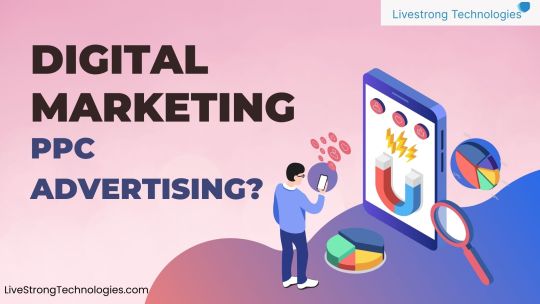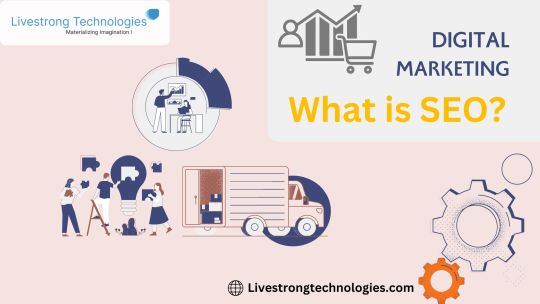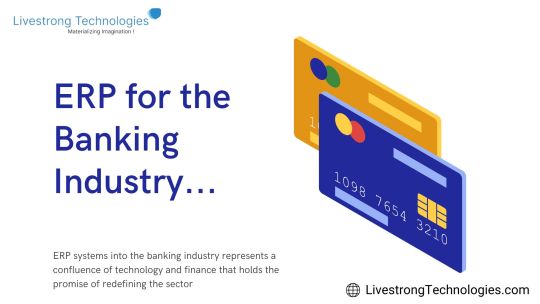Don't wanna be here? Send us removal request.
Text
NetSuite ERP: Features And Benifits
0 notes
Text
0 notes
Text
0 notes
Text
0 notes
Text
0 notes
Text
Top NetSuite consultant in 2024 https://livestrongtechnologies.com/netsuite-solution/
0 notes
Text
What Is Pay-Per-Click (PPC) Advertising?

In today's digital age, getting your business noticed online is more important than ever. That's where pay-per-click (PPC) advertising comes in. But what exactly is PPC, and how can it help your business soar to new heights? Let's break it down in simple terms.
What is Pay-Per-Click (PPC) Advertising?
PPC advertising is a digital marketing strategy where advertisers pay a fee each time their ad is clicked. It's like renting space on the internet to showcase your business to potential customers. These ads can appear on search engines like Google, social media platforms like Facebook, or other websites related to your target audience.
How Does PPC Help Your Business?
1. Immediate Visibility: With PPC, your ads can appear at the top of search engine results pages (SERPs) or on prominent positions in social media feeds, instantly putting your business in front of potential customers.
2. Targeted Reach: PPC allows you to target your ads to specific demographics, interests, locations, and even the devices people are using. This precision targeting ensures that your ads are seen by the right audience, increasing the likelihood of conversions.
3. Cost-Effective: Unlike traditional advertising methods where you pay a flat fee regardless of performance, PPC lets you set a budget and only pay when someone clicks on your ad. This means you're not wasting money on people who aren't interested in your products or services.
4. Measurable Results: One of the biggest advantages of PPC is the ability to track and measure the performance of your campaigns in real-time. You can see exactly how many clicks, impressions, and conversions your ads are generating, allowing you to make data-driven decisions to optimize your campaigns for better results.
5. Flexibility and Control: With PPC, you have full control over your ad campaigns. You can adjust your budget, targeting parameters, ad copy, and keywords on the fly to respond to changing market conditions or business goals.
Getting Started with PPC:
Ready to harness the power of PPC for your business? Here are some steps to get started:
1. Set Clear Goals: Determine what you want to achieve with your PPC campaigns, whether it's driving website traffic, generating leads, or increasing sales.
2. Keyword Research: Identify relevant keywords that your target audience is searching for and incorporate them into your ad campaigns.
3. Create Compelling Ads: Craft engaging ad copy and compelling visuals that grab attention and entice users to click on your ads.
4. Monitor and Optimize: Keep a close eye on your PPC campaigns and analyze their performance regularly. Adjust your targeting, ad creative, and bidding strategy as needed to improve results.
By leveraging the power of PPC advertising, you can elevate your business's online presence, attract more customers, and drive meaningful growth. So why wait? Start your PPC journey today and watch your business soar to new heights!
0 notes
Text
How ERP Can Streamline Your Business Operations and Boost Efficiency

In today's competitive business landscape, efficiency is key. Enterprises are constantly seeking ways to optimize processes, reduce costs, and improve decision-making. This is where Enterprise Resource Planning (ERP) software comes in.
ERP is a comprehensive business management solution that integrates various departments and functions into a single platform. This streamlines operations, eliminates data silos, and empowers businesses to make data-driven decisions.
Here's how ERP can streamline your business:
Automated Workflows: ERP automates repetitive tasks like data entry, report generation, and approval processes. This frees up employees' time for more strategic work and reduces errors.
Improved Collaboration: ERP provides a central platform for departments to share information and collaborate seamlessly. This eliminates communication bottlenecks and ensures everyone is working with the latest data.
Real-Time Visibility: ERP offers real-time insights into inventory levels, customer data, and financial performance. This allows businesses to make informed decisions quickly and adapt to changing market conditions.
Enhanced Inventory Management: ERP optimizes inventory control by tracking stock levels, identifying low stock items, and streamlining reorder processes. This reduces the risk of stockouts and overstocking.
Reduced Costs: By automating tasks, improving efficiency, and eliminating errors, ERP can significantly reduce operational costs.
Improved Customer Satisfaction: ERP streamlines the order fulfillment process and enhances customer service by providing a 360-degree view of customer interactions.
Is ERP Right for Your Business?
ERP is a powerful tool that can benefit businesses of all sizes. However, it's important to carefully consider your specific needs and budget before implementing an ERP system. Here are some questions to ask yourself:
What are your biggest operational challenges?
What departments need to be integrated?
What is your budget for an ERP system?
By carefully considering these factors, you can determine if ERP is the right fit for your business.
Investing in ERP can be a game-changer for your business. By streamlining operations, improving efficiency, and providing real-time insights, ERP can help you gain a competitive edge and achieve long-term success.
0 notes
Text
Boost Your Business with the Power of SEO

In today's digital age, customers are increasingly turning to search engines to find the products and services they need. If your business isn't ranking high in search results, you're missing out on a massive potential customer base. That's where SEO (Search Engine Optimization) comes in.
What is SEO and How Can It Help Your Business?
SEO is the practice of optimizing your website and online presence to improve its visibility in search engine results pages (SERPs). By implementing effective SEO strategies, you can:
Increase website traffic: The higher your website ranks in search results, the more likely people are to find you. This translates to a significant increase in website traffic, bringing more potential customers to your doorstep.
Attract qualified leads: SEO allows you to target your ideal customers by focusing on relevant keywords and phrases they're likely to search for. This ensures you're attracting high-quality leads genuinely interested in what you offer.
Enhance brand awareness: With improved search visibility, your brand name will appear more frequently in search results. This repeated exposure increases brand awareness and familiarity, making your business more recognizable and trustworthy.
Generate organic leads: SEO is an organic marketing strategy, meaning you don't have to pay for every click to your website. This cost-effective approach allows you to generate leads and grow your business sustainably.
Stay ahead of the competition: In today's competitive online landscape, SEO is essential for staying ahead of the curve. By implementing strong SEO practices, you can outrank your competitors and capture a larger market share.
Getting Started with SEO
While SEO can seem complex, there are several steps you can take to improve your website's ranking:
Keyword research: Identify relevant keywords and phrases your target audience is searching for.
Content creation: Develop high-quality, informative content that addresses your target audience's needs and incorporates your chosen keywords.
Website optimization: Optimize your website's structure, meta descriptions, and image alt tags to improve user experience and search engine readability.
Backlink building: Encourage other websites to link back to yours, as this signals authority and trustworthiness to search engines.
Remember, SEO is an ongoing process. Search engine algorithms are constantly evolving, so it's crucial to stay updated on the latest trends and best practices. There are numerous resources available online and SEO professionals who can help you develop and implement a comprehensive SEO strategy for your business.
By investing in SEO, you're investing in the future of your business. With a well-optimized website and a strong SEO strategy, you can unlock long-term growth, attract more qualified leads, and achieve lasting success in the digital marketplace.
1 note
·
View note
Text
NetSuite SuiteCommerce Experts?

Are you Looking to take your e-commerce to the next level? LiveStrong Technologies specializes in implementing and optimizing NetSuite SuiteCommerce Advanced for businesses seeking seamless omnichannel experiences.
1 note
·
View note
Text
Demystifying SEO: Understanding the Basics of Search Engine Optimization

In today's digital age, having a strong online presence is crucial for businesses and individuals alike. Whether you're a small business owner, a blogger, or an aspiring entrepreneur, understanding the fundamentals of Search Engine Optimization (SEO) is essential for maximizing your visibility on the web.
So, what exactly is SEO?
SEO, or Search Engine Optimization, refers to the process of optimizing your website's content and structure to rank higher in search engine results pages (SERPs). In simpler terms, it's about making your website more visible to people who are searching for relevant information online.
Search engines like Google, Bing, and Yahoo use complex algorithms to determine the relevance and authority of web pages in response to a user's search query. SEO aims to improve your website's ranking in these search results by optimizing various factors that search engines consider important.
Why does SEO matter?
In today's highly competitive online landscape, simply having a website is not enough. With millions of websites vying for attention, it's essential to ensure that your site stands out from the crowd. That's where SEO comes in.
Here are a few reasons why SEO matters:
1. Increased Visibility: By optimizing your website for search engines, you can improve its visibility and attract more organic traffic. Studies show that the majority of clicks go to the top few results on the first page of search results, making it crucial to rank as high as possible.
2. Targeted Traffic: Unlike traditional advertising methods, SEO allows you to target users who are actively searching for information related to your products or services. This means that the traffic you attract through SEO is more likely to be interested in what you have to offer, leading to higher conversion rates.
3. Cost-Effectiveness: While paid advertising can be effective, it can also be costly, especially for small businesses with limited budgets. SEO, on the other hand, offers a cost-effective way to attract organic traffic to your website without having to pay for each click.
4. Long-Term Results: Unlike paid advertising, which stops generating traffic as soon as you stop paying for it, the benefits of SEO can be long-lasting. By consistently optimizing your website and producing high-quality content, you can maintain your rankings and continue to attract traffic over time.
How does SEO work?
SEO involves a combination of on-page and off-page optimization techniques aimed at improving your website's relevance, authority, and user experience.
On-page SEO focuses on optimizing individual web pages to make them more search engine-friendly. This includes optimizing meta tags, headings, and content, as well as improving site speed and mobile-friendliness.
Off-page SEO, on the other hand, involves building external signals that indicate the relevance and authority of your website. This includes acquiring backlinks from reputable websites, as well as building a strong presence on social media and other online platforms.
In conclusion, SEO is a powerful tool for improving your website's visibility and attracting more organic traffic. By understanding the basics of SEO and implementing best practices, you can increase your chances of success in the competitive world of online marketing.
0 notes
Text
ERP for the Banking Industry: A Catalyst for Efficiency and Innovation

In the rapidly evolving landscape of the banking industry, characterized by fierce competition, regulatory complexities, and ever-increasing customer expectations, banks are constantly seeking ways to enhance their operational efficiency, risk management, and customer service. One technological innovation that stands as a beacon of transformation in this quest is Enterprise Resource Planning (ERP) systems. Traditionally associated with manufacturing and retail businesses to streamline processes and improve efficiency, ERP systems are now making significant inroads into the banking sector. Let's delve into how ERP systems are reshaping the banking industry, addressing its unique challenges with a blend of sophistication and simplicity.
Understanding ERP in Banking:
At its core, an ERP system integrates various functions within an organization into a unified, coherent system, facilitating the seamless flow of information across departments. For banks, this means knitting together disparate realms such as customer relationship management (CRM), human resources, accounting, risk management, and compliance, among others, into a single, streamlined entity. This integration not only optimizes operational efficiency but also provides a holistic view of the organization’s health, enhancing decision-making and strategic planning.
The Multifaceted Advantages of ERP in Banking:
1. Enhanced Operational Efficiency: By automating routine tasks and processes, ERP systems significantly reduce manual labor and the potential for human error. This automation spans across various functions, from loan processing to account management, enabling banks to deliver faster and more reliable services to their customers.
2. Improved Risk Management: The banking sector operates in an environment fraught with financial, operational, and compliance risks. ERP systems provide sophisticated tools for risk assessment and management, offering real-time insights that help banks mitigate risks more effectively. This is particularly crucial in areas such as credit risk, market risk, and operational risk management.
3. Regulatory Compliance: With financial regulations becoming increasingly stringent, banks face the daunting task of ensuring full compliance while still pursuing growth. ERP systems come equipped with features designed to manage compliance with various regulatory requirements, automating reports, and audits, thereby reducing the likelihood of non-compliance and associated penalties.
4. Better Customer Service: In today's digital age, customers expect personalized, fast, and seamless banking services. ERP systems facilitate this by providing a 360-degree view of the customer, enabling banks to offer tailored services and respond swiftly to customer inquiries and issues. This capability significantly enhances customer satisfaction and loyalty.
5. Strategic Decision Making: By integrating data across various departments and functions, ERP systems offer comprehensive insights into the bank's operations, financial health, and customer base. These insights empower senior management to make informed, strategic decisions that drive growth and innovation.
Implementing ERP in Banking: Challenges and Considerations:
While the benefits are compelling, implementing an ERP system in a bank is not without its challenges. The complexity of banking operations, coupled with the need for stringent data security and compliance, makes ERP implementation a meticulous process. Banks must carefully select an ERP system that aligns with their specific needs, ensuring it offers robust security features, regulatory compliance capabilities, and scalability to accommodate future growth. Additionally, the success of an ERP implementation heavily relies on effective change management, staff training, and a culture that embraces digital transformation.
The Future of ERP in Banking:
As banks continue to navigate the complexities of the modern financial landscape, the adoption of ERP systems is set to grow. Innovations in artificial intelligence, machine learning, and blockchain technology are further enhancing the capabilities of ERP systems, making them even more indispensable to the banking industry. In this era of digital transformation, ERP systems stand as a pillar of innovation, efficiency, and resilience, enabling banks to not only survive but thrive in the face of challenges.
In conclusion, the integration of ERP systems into the banking industry represents a confluence of technology and finance that holds the promise of redefining the sector. By harnessing the power of ERP, banks can unlock unprecedented levels of efficiency, risk management, compliance, and customer service, positioning themselves at the forefront of the financial industry's future.
0 notes